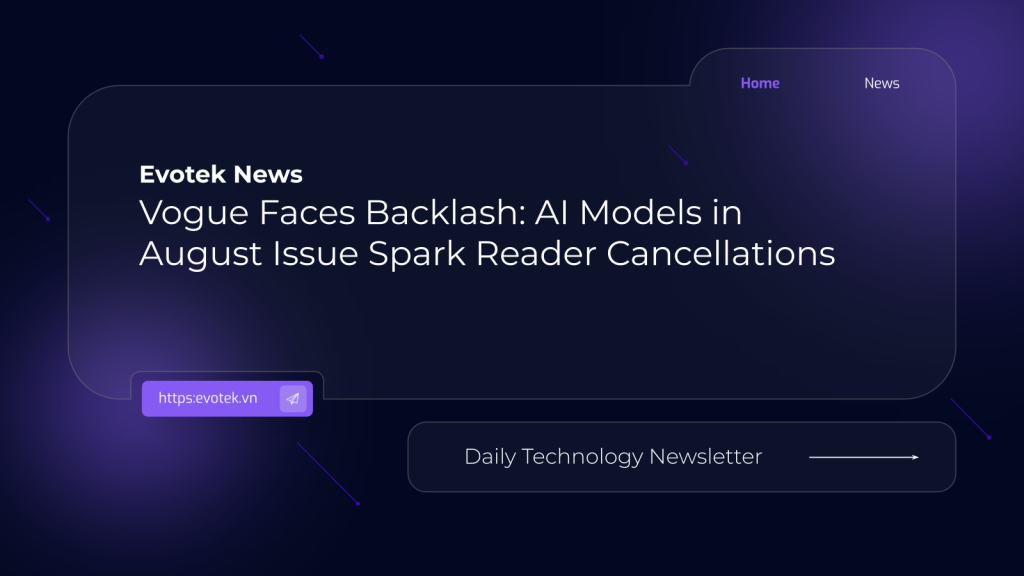The August 2025 issue of Vogue, featuring Anne Hathaway on its cover, has sparked a significant controversy. At the heart of the debate is the magazine’s decision to incorporate AI-generated models within its pages. While some might view this as a pioneering stride into digital innovation, a considerable portion of Vogue’s readership believes the publication has overstepped, leading to widespread criticism and a notable wave of subscription cancellations.
The Controversy Unveiled: AI in Couture
Within the magazine’s opulent spreads, computer-generated figures are showcased in exquisite couture against meticulously designed backdrops. These AI “models” are depicted with seemingly flawless complexions and perfectly idealized proportions. Each image includes a clear disclaimer, noting it was “produced with artificial intelligence,” alongside traditional designer credits. However, this transparency has done little to mitigate the rising concerns among readers, many of whom argue that the use of AI in these advertisements directly displaces human professionals, including models, makeup artists, and photographers.
The Authenticity Debate: Soul vs. Efficiency
Critics are vocal in their assertion that these pristine digital visuals conspicuously lack the “soul” and emotional resonance typically associated with high fashion. Despite showcasing authentic garments from leading labels, many observers feel the images more closely resemble sophisticated video game renderings than authentic, human-centric editorials. While proponents of AI in fashion highlight benefits such as faster production cycles and visually “cleaner” outcomes, opponents contend that these advantages come at the significant cost of emotional depth and the unique artistry that human models infuse into a shoot.
This isn’t the first time Vogue has faced public scrutiny, but its current pivot towards digital “perfection” comes at a crucial juncture when consumers are increasingly valuing genuine and authentic representation. The significant backlash from loyal readers indicates that this particular blend of technology and high fashion may have seriously misfired.
Social Media Outcry and Reader Reactions
The digital sphere quickly erupted with frustration as readers expressed profound disapproval of the AI-generated imagery. Many argued that replacing human models with artificial intelligence devalues the dedication, skill, and passion models invest in their profession.
One particularly pointed reaction came from a long-time subscriber who tweeted, "Had to end the Vogue magazine subscription I’ve had for years because the latest magazine used AI models ??? In Vogue? AI models in Vogue?"
Demonstrating the generational impact, a mother recounted a personal anecdote: her Gen Z daughter, a proponent of physical media, received her latest print issue of Vogue. Upon discovery of the AI models, her daughter unequivocally declared, “Nope. It’s definitely AI. I’m canceling.” The mother further elaborated that her daughter’s decision stood firm, regardless of whether the images were for advertisements or editorial content. This incident highlights a growing sentiment: “Advertisers think Gen Z is hooked on AI and won’t care. But some of them do. AI isn’t always a flex. Sometimes it’s the reason they bounce.”
The Future of Fashion and Authenticity
Beyond mere emotional reaction, fashion enthusiasts are voicing deeper concerns regarding the trajectory of representation and genuine authenticity within the industry. While artificial intelligence models are undeniably gaining momentum, their widespread adoption risks alienating the very demographic and loyal readership that brands, including Vogue, aspire to cultivate and engage. This evolving landscape prompts a critical question: in the pursuit of digital perfection, is the fashion world inadvertently sacrificing the human connection that defines its allure?

 日本語
日本語 한국어
한국어 Tiếng Việt
Tiếng Việt 简体中文
简体中文